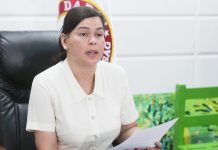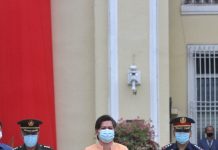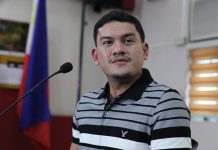THE archbishop and auxiliary bishop of Davao and the bishops of Digos, Tagum and Mati (DADITAMA) have issued a joint pastoral statement on the controversial issue of aerial spraying in banana plantations of the Davao region, saying that “there is no sufficient data to warrant total ban on aerial spraying.”
The pastoral letter, issued on March 3, was signed by Davao Archbishop Fernando R. Capalla, Tagum Bishop Wilfredo D. Manlapaz, Mati Bishop Patricio H. Alo, Digos Bishop Guillermo V. Afable and Davao Auxiliary Bishop George B. Rimando.
Some environmental groups have been advocating the ban on aerial spraying on ground of risks to health, but banana growers push for regulated aerial spraying that would protect both human health and the $720-million banana industry that employs about half a million workers directly and indirectly.
Among the recommendations of the five DADITAMA prelates is the conduct of “a more exhaustive study and scientific research on the effects of aerial spraying.” They also urged a dialogue among all parties concerned.
Before coming out with the pastoral statement, the bishops invited several groups on December 2 and 3 last year during their quarterly meeting to state their positions on the issue of aerial spraying.
Among those invited were representatives from the Mamamayang Ayaw sa Aerial Spray (MAAS), Interface Development Interventions, Inc. (IDIS), Pilipino Banana Growers and Exporters Association (PBGEA), the Department of Health (DOH) in Davao del Norte, the Department of Environment and Natural Resources (DENR), the Department of Agriculture (DA) and the Fertilizers and Pesticides Authority (FPA).
Officials of the PBGEA welcomed the pastoral letter of the bishops.
The December quarterly meeting ended without any collective decision on the issue of aerial spraying.
The prelates met again for their quarterly meeting on March 2 and 3 and discussed the aerial spraying issue anew. During that meeting a question was posed: “Based on the pros and cons on the aerial spraying issue, what can be the DADITAMA stand?”
On March 3, after listening to the reports through their own process validating the issues and presentations of the different stakeholders, the prelates issued a six-point statement:
“Based on the information and clarifications gathered during the two quarterly meetings, we believe that there are no sufficient data to warrant the total ban on aerial spraying.
“To avoid future harmful effects in the use of fungicides, safety measures in the regulated use of fungicides should be strictly implemented with corresponding sanctions by collective efforts of national agencies, LGUs, and local NGOs.
“We recommend that the multi-partite monitoring team established by the government agencies to be more active in monitoring the operations of banana plantations, to do a more exhaustive study and scientific research on the effects of aerial spraying in their respective areas of responsibilities.
“We recommend to everyone concerned to seriously consider the CBCP (Catholic Bishops Conference of the Philippines) recommendation regarding the shift to organic farming as a safer agricultural practice.
“We deplore the distortion of the issue by ideological and vested interest groups.
“We urge all contending parties to sit down together to resolve the issues through a truthful and mutually respectful dialogue for the sake of the common good.”
Banana growers have employed aerial spraying of low-dose fungicide to fight sigatoka, a banana leaf disease caused by a fungus that reduce yield in banana plantations as well as the quality of the produce. Aerial spraying is more efficient and safe compared to the other alternatives such as ground spraying or boom spraying, which is more expensive, slow and uses more workers to cover wide areas.
The prelates of DADITAMA apparently took a stand opposite that of anti-spray groups and the Davao City Council, which adopted last year an ordinance banning aerial spray.
The ordinance was sustained by the local court but reversed by the Court of Appeals. The city filed a motion for reconsideration but it was denied by the Court of Appeals. The issue is now pending before the Supreme Court.
Also last December, the Department of Health under the then Secretary Francisco Duque recommended to President Arroyo to ban aerial spraying in banana plantations allegedly because it poses a risk to people’s health and environment. Malacañang has not acted on Duque’s recommendation.
The DOH based its recommendation on a controversial 2006 DOH-funded study on health and environmental assessment of sitio Camocaan in Hagonoy, Davao del Sur, which was the subject of an earlier published article about how some residents whose health has been allegedly affected by aerial spraying. The article has been investigated by media and health experts and was found to have no solid basis.
The DOH study was also found in a peer review by experts from the World Health Organization (WHO) to be “inadequate, inconclusive” and that it has loopholes and the data is limited.
0 Comments
Oldest






